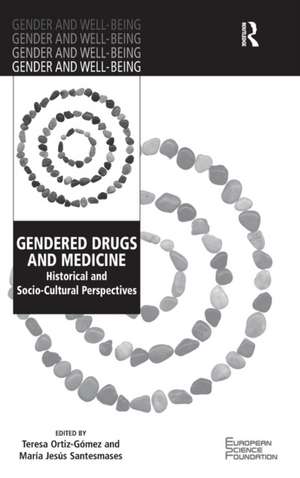Gendered Drugs and Medicine: Historical and Socio-Cultural Perspectives: Gender and Well-Being
Autor Teresa Ortiz-Gomez, María Jesús Santesmasesen Limba Engleză Hardback – 11 iun 2014
| Toate formatele și edițiile | Preț | Express |
|---|---|---|
| Paperback (1) | 455.78 lei 6-8 săpt. | |
| Taylor & Francis – 9 sep 2016 | 455.78 lei 6-8 săpt. | |
| Hardback (1) | 1114.70 lei 6-8 săpt. | |
| Taylor & Francis – 11 iun 2014 | 1114.70 lei 6-8 săpt. |
Preț: 1114.70 lei
Preț vechi: 1359.39 lei
-18% Nou
Puncte Express: 1672
Preț estimativ în valută:
213.33€ • 220.08$ • 180.55£
213.33€ • 220.08$ • 180.55£
Carte tipărită la comandă
Livrare economică 04-18 martie
Preluare comenzi: 021 569.72.76
Specificații
ISBN-13: 9781409454045
ISBN-10: 1409454045
Pagini: 260
Ilustrații: Includes 9 b&w illustrations
Dimensiuni: 156 x 234 x 16 mm
Greutate: 0.61 kg
Ediția:Revised edition
Editura: Taylor & Francis
Colecția Routledge
Seria Gender and Well-Being
Locul publicării:Oxford, United Kingdom
ISBN-10: 1409454045
Pagini: 260
Ilustrații: Includes 9 b&w illustrations
Dimensiuni: 156 x 234 x 16 mm
Greutate: 0.61 kg
Ediția:Revised edition
Editura: Taylor & Francis
Colecția Routledge
Seria Gender and Well-Being
Locul publicării:Oxford, United Kingdom
Notă biografică
Teresa Ortiz-Gómez (MD, PhD in History of Medicine) is professor of History of Science at the University of Granada, Spain. She has published widely on gender and the history of medicine, the history of health professions, women in medicine and the history of midwives in Spain. She is currently working on the history of contraception and sexuality in Spain during Francoism and the Spanish transition to democracy. MarÃa Jesús Santesmases (PhD in chemistry, historian of science) is a research fellow at the Departamento de Ciencia, TecnologÃa y Sociedad, Instituto de FilosofÃa, Centro de Ciencias Humanas y Sociales, CSIC in Madrid, Spain. She studies the post-WWII history of experimental biology and medicine, and is currently working on the early practices of human cytogenetics and on the history of antibiotics in Spain.
Recenzii
’The essays in this volume inject a much-needed dose of gendered analysis into the historical study of pharmaceuticals by focusing on women as agents in the production and consumption of drugs as both material entities and cultural symbols. The collective result is a rich portrait of how gender has shaped scientific research, medical practice, commercial markets, and public perceptions.’ Elizabeth Siegel Watkins, University of California, San Francisco, USA ’Gendered Drugs and Medicine recovers the diverse ways women have produced, consumed, demanded, and administered pharmaceuticals. If prescribing drugs has often entailed prescribing gender, these authors also explore the complex and subversive side-effects of managing health and sexuality through pills. This is an innovative collection on a topic of global significance.’ Angela N.H. Creager, Princeton University, USA
Cuprins
Part 1 Gender and Women in Pharmaceutical Research, Consumption and Industry; Chapter 1 Oestrogens and Butter Yellow: Gendered Policies of Contamination in Germany, 1930–1970, HeikoStoff; Chapter 2 Rising from Failure, Marta I. GonzálezGarcía; Chapter 3 Gender in Research and Industry: Women in Antibiotic Factories in 1950s Spain, María JesúsSantesmases; Part 2 Contraceptives for Women: Between Users and Prescribers; Chapter 4 Spermicides and their Female Users After World War II: North and South, IlanaLöwy; Chapter 5 Managing Medication and Producing Patients: Imagining Women’s Use of Contraceptive Pill Compliance Dispensers in 1960s America, CarrieEisert; Chapter 6 Doctors, Women and the Circulation of Knowledge of Oral Contraceptives in Spain, 1960s–1970s, AgataIgnaciuk,, TeresaOrtiz-Gómez,, EstebanRodríguez-Ocaña; Chapter 7 The Contraceptive Pill, the Pharmaceutical Industry and Changes in the Patient-Doctor Relationship in West Germany, UlrikeThoms; Part 3 Users and Abusers Then and Now: Discourses and Practices; Chapter 8 Women, Men, and the Morphine Problem, 1870–1955, Jesper VaczyKragh; Chapter 9 ‘A gendered vice’? Gender Issues and Drug Abuse in France, 1960s–1990s, AlexandreMarchant; Chapter 10 , NuriaRomo-Avilés,, CarmenMeneses-Falcón,, EugeniaGil-García;
Descriere
Drugs are considered to be healers and harmers, wonder substances and knowledge makers; objects that impact on social hierarchies, health practices and public policies. This book focuses on the ways that gender, race/ethnicity and class, influence the design, standardisation and circulation of drugs throughout several highly medicalised countries. Seventeen authors from eight different countries, both European and non-European, analyse the extent to which the dominant ideas and values surrounding masculinity and femininity shape the research, prescription and use of drugs by women and/or men within particular social and cultural contexts.










